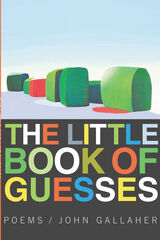2 books by Gallaher, John

The Little Book of Guesses
John Gallaher
Four Way Books, 2007
The Little Book of Guesses takes place in a 21st-century world where we’ve “accustomed ourselves to our customized dogs” and “honed the idea of ideas there in the obstacle race / that’ll never catch up.” But while it’s a world we’re not unfamiliar with—“in the New Age tourism is the answer”—Gallaher’s turn of speech is at once unique and exact, making the familiar strange and the strange familiar. Serving as our escort through scenes including “The War President’s Afternoon Tea” and “A Moment in the Market of Moments,” Gallaher offers us several guidebooks: “to the Afterlife,” “to When Things Were Better,” and a “Pocket Guide to Some Foreign Country.” Even as these poems guess, they are confident in the form and lyricism. Abundant with comedy, they contain more than a dose of irony and cynicism, and still find room for the quiet anger of frustration, of knowing that what seems most surreal about this world often turns out to be reality itself.
[more]

My Life in Brutalist Architecture
John Gallaher
Four Way Books, 2024
As John Gallaher prefaces this book, “It should have been an easy story to sort out, but it took fifty years.” My Life in Brutalist Architecture confronts the truth of the author’s adoption after a lifetime of concealment and deceptions with lucid candor, startling humor, and implacable grief. Approaching identity and family history as a deliberate architecture, Gallaher’s poems illuminate how a simple exterior can obscure the structural bricolage and emotional complexity of its inner rooms. This collection explores — and mourns — the kaleidoscopic iterations of potential selves as prismed through our understanding of the past, a shifting light parsed by facts, memories, and a family’s own mythology. The agonizing beauty of My Life in Brutalist Architecture is its full embrace of doubt, a jack that makes space for repair even as it wrenches one apart. After his daughter’s birth, the author considers the only picture of himself before the adoption, captioned “Marty, nine mos.” In legal documentation, in the photographic archive, this child no longer exists. “I appear next as John, three-and- a-half,” Gallaher writes, “and Marty disappears, a ghost name.” “And so, then, what does the self consist of?” he asks. The answer is, necessarily, no answer. “The theme is time. The theme is unspooling,” Gallaher summarizes, testifying to a story’s inability to recover the past or isolate its meaning. Equal parts reckoning and apologia, Gallaher’s latest work disrupts the notion that what you don’t know can’t hurt you, attesting to the irrevocable harm of silence, while offering mercy in its recognition of our guardians as deeply flawed conduits of care. Referencing Vitruvius’s foundational elements of architecture (firmitas, utilitas, and venustas, or solidity, usefulness, and beauty), Gallaher fuses an elegy and an ode to family when he writes “that in the third principle of architecture, / they bathe you and feed you. You won’t remember. // And they know this.” Gallaher’s lyricism encapsulates this, humanity’s consummate tragedy and profoundest grace — that love, even when forgotten, persists.
[more]
READERS
Browse our collection.
PUBLISHERS
See BiblioVault's publisher services.
STUDENT SERVICES
Files for college accessibility offices.
UChicago Accessibility Resources
home | accessibility | search | about | contact us
BiblioVault ® 2001 - 2024
The University of Chicago Press









